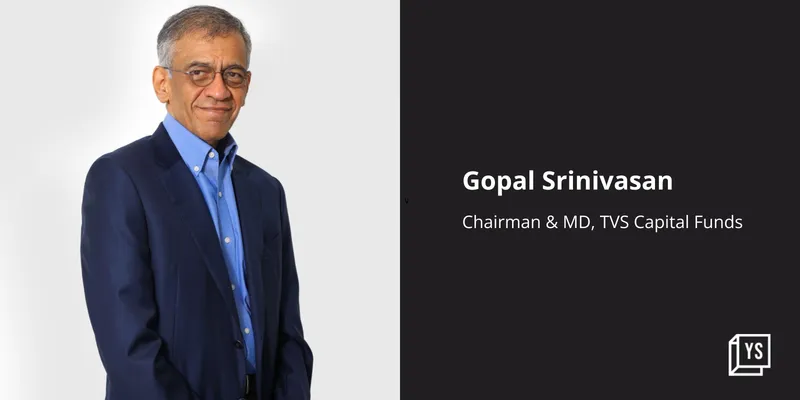How domestic funding in startups can make India aatmanirbhar
Gopal Srinivasan, Founder and CMD of TVS Capital Funds, who is a vocal supporter of domestic capital investment in Indian startups, believes the country stands to benefit in multiple ways.
The Indian startup ecosystem continues to attract capital from multiple sources, with a majority of investment coming in from foreign investors.
At the same time, there is a growing trend of domestic capital making its way into the Indian startup ecosystem primarily through the venture capital and private equity route. The primary contributors to this are individual investors, HNIs, and family offices, though the participation of institutional capital has been quite less.
In such a scenario, there is a growing need for increased participation of domestic capital into the Indian startup ecosystem, which are primarily new-age technology driven businesses.
Gopal Srinivasan, Founder and CMD of TVS Capital Funds, is a vocal supporter of higher participation of domestic capital into Indian startups as he believes the country stands to benefit in multiple ways.
Commenting on the returns generated from the investments in the Indian startup sector, Gopal Srinivasan, in an interview with YourStory, says, “Retaining profit is a matter of national security.”
Edited excerpts from the interview:
YourStory [YS]: Could you provide us with an overview of the domestic private capital in India?
Gopal Srinivasan [GS]: One needs to look at the alternative investment funds (AIF) data in the country provided by the SEBI, where Category II of this fund stood at Rs 5.6 lakh crore at the end of June 2022. In comparison, it was Rs 3.9 lakh crore a year ago. My estimate is that about 20 percent of this money is Indian capital, which conservatively may be about Rs 50-60,000 crore. Clearly, this is not a bad number, but the question is, can it reach to about Rs 1 lakh crore or Rs 1.5 lakh crore?
One needs to look at how the public markets have performed over the last one year where foreign institutional investors (FIIs) were withdrawing, but domestic institutional investors and retail investors were protecting the market. This is exactly the same picture that has to come from private capital. We need to reach the figure of Rs 1 lakh crore or Rs 1.5 crore very soon.
YS: What are the pools of domestic capital that need to be unlocked?
GS: Clearly, it is going to happen from insurance, pension, and retail. These three are untapped pools, which have to be unlocked. In India, the biggest success story has been the SIDBI funds of fund for startups, which has created 40 fund managers at seed level, but also need more growth funds as just venture fund is not enough.
From the insurance funds, the amount allocated for private capital is very small at 1-1.5 percent, and this needs to be tripled. In case of pension funds, the broad rules have been framed, but there are certain operational procedures that have to be implemented on how to appoint individual managers to do the fund activity.

Retail is also an important participant and there is no reason why they cannot participate in the VC-PE industry, and one can create a fund of funds kind of structure where it can be regulated through the rules of the mutual fund industry. The unlocking of these pools will make us aatmanirbhar on capital.
We also have to make changes in the regulations of the fund management structure to ensure India becomes an attractive investment destination. These primarily centre around the direct and indirect tax structure and the securities regulation act. The government has formed an expert committee to look into these aspects.
YS: How will the startup ecosystem benefit from increased participation of domestic capital?
GS: The benefits can be looked at from a quantifiable perspective as well as the softer aspect. On the softer aspect, Limited Partners (LPs) from India will have a better sense of judging managers, rather than from somebody sitting outside in terms of being closer to market, better decision making, etc.
Also, more fund managers will find the money as this business is as much about opportunity as it is about a fund manager. When the economy, entrepreneur, and talent come together, there is a better opportunity.
The hard or quantifiable part is the question of how much profit should be exported and how much stays in India. For example, about $20-25 billion gets invested in India every year, with returns of about 12 percent. This means one is looking at a profit of $25 billion in the next six to eight years. Retaining this profit is a matter of national security.
The government can also purpose these funds for other strategic intent in areas which may not necessarily attract private capital and it can be incentivised.
YS: What will be the role of foreign capital?
GS: There is no need to go for 100 percent domestic capital as there is a lot of meritocracy in foreign capital, and they come with a lot of qualitative factors where there is value addition. There are some excellent foreign funds which drive tremendous value and the government can ask them to blend in Indian capital. Why cannot we ask some of the leading VCs or PE funds to have around 30 percent of money from Indian LPs?
YS: How can India increase the direct investment of domestic capital into startups?
GS: Direct investments happen largely through angel investors who are in some way connected to the industry. There are family offices which are created by people who are generally entrepreneurs themselves who have a high degree of confidence in terms of investing in startups. However, in the long term, whether they will make better returns than fund managers is a big question.
Generally, they will underperform. Many of them are taking the hybrid route where they make both direct investments as well co-invest in other funds. Today, if access to a fund becomes an issue for many of these family offices, access to good managers will also become an issue.
YS: How can one bring together the risky nature of startup investments and a conservative domestic capital?
GS: This will require a diversified portfolio approach as no one can predict what will happen with any investment decision. A VC is a prudent person, and so is a LP, and they will act in a manner where the focus is on the total return on one’s portfolio. One needs to have a clear diversification strategy.
Edited by Megha Reddy








